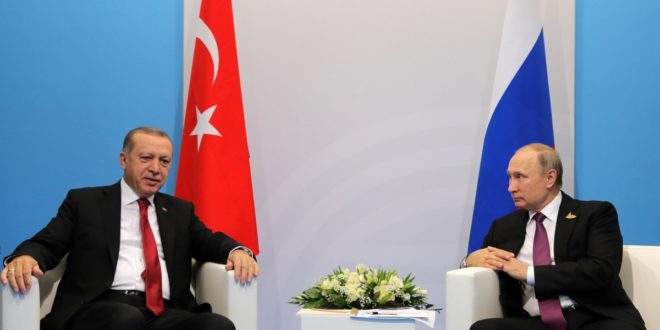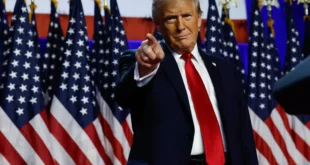OPINION
Shehab Al-Makahleh •
Russian President Vladimir Putin is scheduled to meet Turkish President Recep Tayyip Erdogan in Ankara on September 28, 2017. The two leaders are expected to dovetail their positions over regional issues before Turkish Special Forces get the nod to intervene in Idlib, the last stronghold of militant opposition forces in Syria.
Putin’s visit to Ankara comes a few days prior to the scheduled visit of Saudi King Salman bin Abdulaziz Al Saud’s to Moscow on October 5-7, 2017. After patching up an acrimonious row between the countries over the downing of a Russian jetfighter in November 2015 over Syria, both leaders have pledged to restore their political and economic relations to pre-crisis levels.
The recent Turkey-Russia rapprochement has come about as a result of both countries’ tense relations with the West, particularly with the United States, mainly after the failed July 2016 coup attempt in Turkey.
Since then, the two countries have forged an informal agreement wherein Turkey has stopped giving support to opposition groups that threatened Russian interests in Syria, while Russia refrained from supporting Kurdish groups operating near the Turkish border with Syria (in Al Bab, Idlib and Aleppo), suspected of fomenting Kurdish secessionism inside Turkey. In contrast, Russia did not seek to block Turkish forces from taking control of the Syrian border regions which were under the control of Kurds and ISIS.
External interventions
Over the years, Russia has accused Turkey of backing Islamist anti-Assad groups, including ‘terror’ outfits operating inside Russia while Turkey has been at war with the Kurdistan Workers’ Party (PKK) and the PKK’s Syrian allies. Ankara now seeks Russian support to secure its borders from external intervention in Turkish internal affairs.
Turkish leadership is seeking strategic relationship with Russia to replace the loss of its Western alliance. In other words, Ankara is effecting a shift toward a more “Eurasian-ist” orientation due to the proximity of the region, the overlapping of interests, common cultural values and language.
After winning the war in Syria, Russia is now seeking to ensure its peace – a mission no less difficult than going to war. Initially, Russia used Turkey as a key partner to make the Syrian opposition accept a truce and join peace talks for reaching a political settlement.
Later, Moscow called for a peace conference in Astana, the capital of Kazakhstan, which involved Turkey and Iran. The countries formed a diplomatic triad for setting up de-escalation zones in Syria in order to end the war and stop the division of the country. Russia chose Astana as a venue for the talks to send a message to the US that it should not get close to Russian borders through former republics of the Soviet Union.
Both Putin and Erdogan share a similar stance towards leadership and both have witnessed a revival in conservative, nationalist domestic politics, overseeing awkward ties with Europe. Putin’s visit to Turkey raises eyebrows in the West as it comes at a time when Turkey has strained its relations with the EU and the West in general.
Nowadays, Moscow seeks to be in the position of a mediator to maintain good relations with various parties concerned. Differences between the parties can be dealt with in accordance with conditions that the Kremlin sees fit, as happened in the dispute with Erdogan.
Russian-Turkish bilateral relations have several common traits: pragmatism, multi-faceted approach, commonalities, reliance on energy resources, geopolitical power, military performance, circumspection toward the West. All of this has fueled the Russian and Turkish pursuit to play a pivotal role at the Eurasian and Middle Eastern landscapes.
The economic factor
In 2014, Putin and Erdogan signed several agreements on bilateral trade with the two countries hoping that their annual trade volume would reach $100 billion by 2020. However, the most important achievement of the meeting was the agreement to expand cooperation in natural gas trade. Russia aimed through these agreements to also increase its gas exports to Turkey by more than 3 billion cubic meters because of the latter’s increasing need for energy.
Turkey imports 93 percent of its energy needs, 97 percent of which is natural gas. Ankara buy 60 percent of its gas from Russia, which makes it the second largest importer of Russian natural gas after Germany. The value of Turkish exports to Russia does not exceed $6 billion.
Putin and Erdogan have officially met each other more than 30 times, even when both countries were not having harmonious relations. However, both sides know very well that political visions are kept aside when it comes to investments and economy including natural gas. From a purely economic perspective, Turkey cannot keep up with the United States and the EU on the issue of sanctions against Russia.
In the wake of instability in Iraq and Syria, Ankara does not have many alternative energy options, except from taking its energy from Russia as Turkey is incapable of indulging in any political adventurism that might endanger its energy sources that are necessary for its industry. Trade exchange between both countries reached $40 billion by the end of 2016 and is slated to increase this year.
The military and security factor
The main factor for Russia behind improving its ties with Turkey has been its overriding security and military interests. Putin is deeply concerned about the security situation in Syria, especially those Russian fighters who fight with ISIS and other terrorist groups.
Russian president is seeking Turkish assistance in this regard to make sure that none of the Russian extremists in Iraq and Syria return home. As for the Turkish president, his chief concern is the comatose Nagorno-Karabakh conflict between Armenia and Azerbaijan.
Turkish international relations have undergone such sharp twists and turns since 2014 that its unpredictability appears to be the only safe prediction for the future. Both leaders believe that should work together to serve their own countries regardless of what other leaders believe about them.
The recent military rapprochement between Ankara and Moscow with the S-400 deal has upset NATO officials because the Russian system, an anti-air defense system, is incompatible with NATO’s. With this deal, Russia will be the third biggest arms exporter to Turkey after Germany and the US.
Erdogan, who plans to visit Iran in October to bolster military cooperation, will also be discussing the repercussions of any independent Kurdish state that might inflame separatist tensions in Turkey, Iran, Iraq and Syria.
_____________________________
Shehab Al-Makahleh is Director of Geostrategic Media Center, senior media and political analyst in the Middle East, adviser to many international consultancies. He can be reached on Twitter at: @shehabmakahleh and @Geostrat_ME.
 Geostrategic Media Political Commentary, Analysis, Security, Defense
Geostrategic Media Political Commentary, Analysis, Security, Defense





